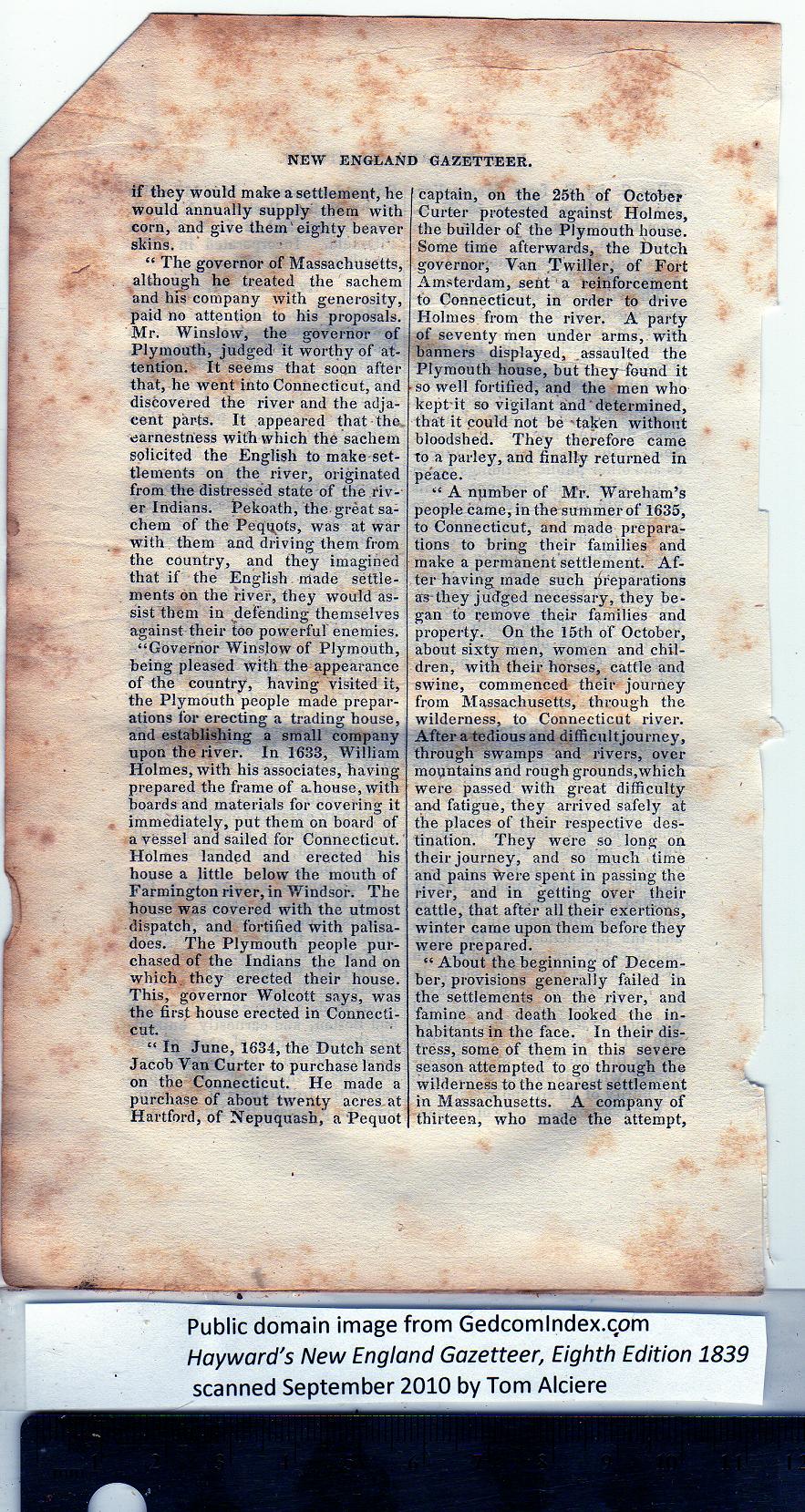|
if they would make a settlement, he
would annually supply them with
corn, and give them eighty beaver
skins.
“ The governor of Massachusetts,
although he treated the sachem
and hfs company with generosity,
paid no attention to his proposals.
Mr. Winslow, the governor of
Plymouth, judged it worthy of at-
tention. It seems that soon after
that, he went into Connecticut, and
discovered the river and the adja-
cent parts. It appeared that the.
earnestness with which the sachem
solicited the English to make set-
tlements on the river, originated
from the distressed state of the riv-
er Indians. Pekoath, the great sa-
chem of the Peqqots, was at war
with them and driving them from
the country, and they imagined
that if the English made settle-
ments on the river, they would as-
sist them in defending themselves
against their too powerful enemies.
“Governor Winslow of Plymouth,
being pleased with the appearance
of the country, having visited it,
the Plymouth people made prepar-
ations for erecting a trading house,
and establishing a small company
upon the river. In 1633, William
Holmes, with his associates, having
prepared the frame of a.house, with
boards and materials for covering it
immediately, put them on board of
a vessel and sailed for Connecticut.
Holmes landed and erected his
house a little below the mouth of
Farmington river, in "Windsor. The
house was covered with the utmost
dispatch, and fortified with patisa-
does. The Plymouth people pur-
chased of the Indians the land on
which they erected their house.
This, governor Wolcott says, was
the first house erected in Connecti-
cut. |
“ In June, 1634, the Dutch sent
Jacob Van Curter to purchase lands
on the Connecticut. He made a
purchase of about twenty acres at
Hartford, of Nepuquash, a Pequot
captain, on the 25th of October
Curter protested against Holmes,
the builder of tbe Plymouth house.
Some time afterwards, the Dutch
governor, Van Twiller, of Fort
Amsterdam, sent a reinforcement
to Connecticut, in order to drive
Holmes from the river. A party
of seventy men under arms, with
banners displayed, .assaulted the
Plymouth house, but they found it
so well fortified, and the men who
kept it so vigilant and' determined,
that it could not be ‘taken without
bloodshed. They therefore came
to a parley, and finally returned in
peace.
“ A number of Mr. Wareham’s
people came, in the summer of 1635,
to Connecticut, and made prepara-
tions to bring their families and
make a permanent settlement. Af-
ter having made such preparations
as they judged necessary, they be-
gan to remove their families and
property. On the 15th of October,
about sixty men, women and chil-
dren, with their horses, cattle and
swine, commenced their journey
from Massachusetts, through the
wilderness, to Connecticut river.
After a tedious and difficult journey,
through swamps and rivers, over
mountains and rough grounds,which
were passed with great difficulty
and fatigue, they arrived safely at
the places of their respective des-
tination. They were so long on
their journey, and so much time
and pains Were spent in passing the
river, and in getting over their
cattle, that after all their exertions,
winter came upon them before they
were prepared.
“About the beginning of Decem-
ber, provisions generally failed in
the settlements on the river, and
famine and death looked the in-
habitants in the face. In their dis-
tress, some of them in this severe
season attempted to go through the
wilderness to the nearest settlement
in Massachusetts. A company of
thirteen, who made the attempt, |
